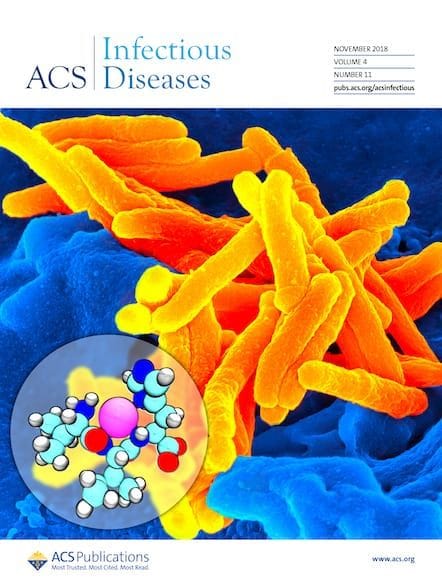ACS Infectious Diseases highlights the contributions of graduate students and postdoctoral scholars researching within the various subfields covered in the journal.
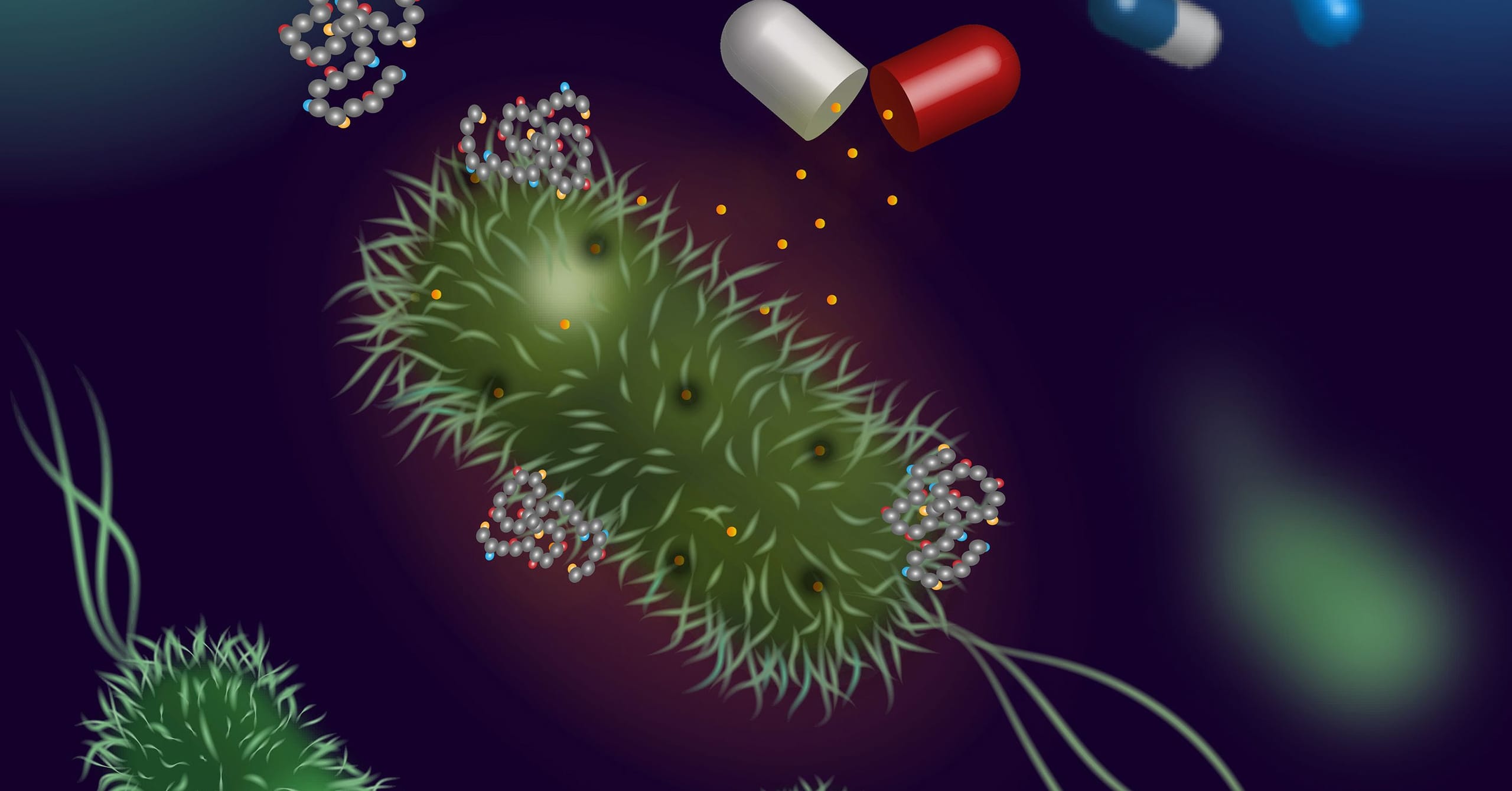
From the devastating epidemics of the last millennium such as plague, flu, etc. to the most recent global COVID pandemic, our battles with infectious diseases and pathogens have long shaped the trajectory of human health, society and science. The field of infectious diseases research remains one of the most crucial and vital areas of exploration, innovation and clinical translation.
Today, as the world gears up to face new microbial threats, a new generation of researchers is stepping up to ask bold questions and seek transformative solutions. ACS Infectious Diseases recognizes it is imperative that we support a new wave of researchers in this discipline and their collective research efforts as a means of advancing this field forward. We reached out to our Editorial and Advisory Board members and asked for their input on Ph.D. candidates and postdoctoral researchers that we could interview. The interviews presented here offer a rare glimpse into the ideas, motivations, and aspirations which are driving these early-career researchers. We asked them about their ongoing research, the directions which they aim to explore next, and their views on where this field of research is heading in the coming years. Their answers reflect a diverse and deeply engaged global community, united by a shared urgency to better identify, understand and eventually address the challenges associated with microbial pathogens and infectious diseases.
We have perspectives from young researchers at different stages of their doctoral or post doctoral journeys, working on almost all aspects of infectious diseases research, ranging from therapy, host-pathogen interactions, pathogenesis mechanisms, drug resistance, diagnosis, etc. and covering a diversity of pathogens and model systems, such as bacteria, fungi, viruses as well as parasites.
What emerged from this effort is not merely a collection of career trajectories and opinions. Rather, this interview series is actually providing a map of where infectious diseases may be heading in the coming decades. Our young scientists are well aware and seized about the changing paradigms in the field, and the shift towards interdisciplinary research approaches for a more robust response to the challenges. Their responses to the areas of interest that they would like to pursue in their next career stage are quite frankly an eye opener. The comprehensive thought, and diversity in the topics astounds a keen reader. One is assured that the next decade will see pioneering research on so many themes, such as intracellular pathogenesis, host-microbiome and host-pathogen interactions, bacterial persistence and biofilms, RNA-targeting therapies for infection, antimicrobial therapy for complicated infections, microbiome-driven therapy, bioinformatics, new diagnostic modalities, explorations into the infection-inflammation axis, microbial stress response, and last but not the least, antimicrobial stewardship!
The composite outlook of our young researchers is a refreshing perspective on the field, and we are positive that our readers will enjoy reading this interview series. Along with highlighting some of our young researchers, this initiative will also spark a refreshing conversation on redefining the next decade for our field.
Learn more about these early career researchers and their view on the field of infectious diseases below.
Yash Acharya
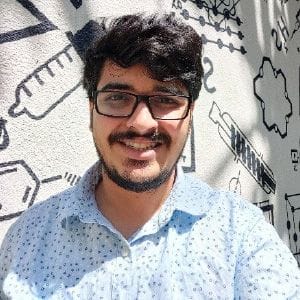
I am pursuing a Ph.D. with Prof. Jayanta Haldar at JNCASR, Bengaluru, India. My research interests include the development of dual-functional small molecules to tackle drug-resistant pathogens and mitigate antigen-responsive hyperinflammation. Along with mitigating AMR, understanding host-pathogen interactions and tackling non-inherited forms of phenotypic resistance, such as biofilms, metabolically repressed antibiotic tolerant cells, intracellular bacteria, is the goal of my work. It has been my endeavour to understand the physiology of infection and host-pathogen interactions and then bridge this with the understanding of antibiotic chemistry to emerge with new and robust solutions to AMR.
Veena Ammanathan

My career in Life Sciences began with an engineering degree in Biotechnology from Anna University, India (2009-2013). I then pursued an Integrated Ph.D. (MS–Ph.D.) in Molecular Biology at the Jawaharlal Nehru Centre for Advanced Scientific Research (JNCASR), India (2013–2020), where my doctoral research focused on unravelling the mechanistic aspects of autophagy to enhance host defence against bacterial infections. Following my Ph.D., I initiated an independent research project on host–pathogen interactions at CSIR-Central Drug Research Institute (CDRI), India, supported by funding from the Science and Engineering Research Board (SERB). Currently, I am working as an Early Career Fellow- DBT/Wellcome Trust India Alliance at CDRI. My ongoing research explores the role of peroxisomes in the context of Inflammatory Bowel Disease (IBD), intending to understand their contribution to host immune regulation.
Samantha Bann
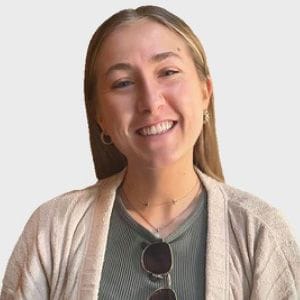
I am a post-doctoral research associate specialising in tackling antimicrobial resistance (AMR) via the development of novel antimicrobial peptides (AMPs). I am based in the Cochrane lab at Queen’s University Belfast where I have worked on multiple projects to combat drug-resistant pathogens, including both linear and cyclic AMPs. Peptide research then transcended into the stereoselective synthesis of branched difunctionalised lipids that are ubiquitous throughout natural products. The development of this novel synthetic route offers a blueprint for libraries of branched lipids with defined stereochemistry that may be required in the synthesis of essential natural products.
Yaron Bram
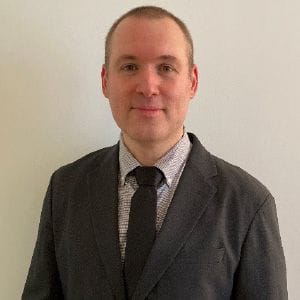
I completed my Ph.D. in Prof. Ehud Gazit’s lab at Tel Aviv University, where I investigated the early self-assembly mechanisms of islet amyloid polypeptide (IAPP), a process implicated in type 2 diabetes. As a postdoctoral fellow in Prof. Robert E. Schwartz’s lab at Weill Cornell Medicine, my research focuses on identifying host–virus interactions that regulate hepatitis B virus (HBV) infection in hepatocytes. Utilizing stem cell–derived hepatocytes, primary human hepatocytes, and humanized liver mouse models, we aim to uncover key molecular factors that govern HBV persistence and replication, ultimately contributing to the development of targeted antiviral therapeutics which currently are not available for chronic infected patients.
Camila Carvalho
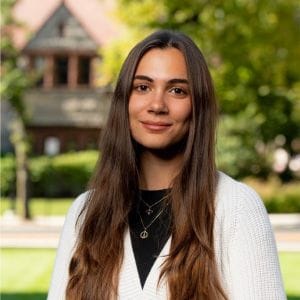
I’m a third-year Ph.D. candidate in Biomedical Engineering in Prof. Anita Shukla’s lab at Brown University. I earned my Bachelor of Science in Biomedical Engineering from Worcester Polytechnic Institute (WPI) in 2022, where I worked in Prof. Jeannine Coburn’s lab, developing hydrogels for the controlled release of cancer therapeutics. My current research focuses on developing novel therapeutics for treating fungal infections using nanoengineered materials (i.e., liposomes) and smart hydrogels. I’m passionate about advancing drug delivery systems and engineering therapeutics with antimicrobial properties. My broader research interests include infectious diseases, nanoengineering, women’s health, and investigating biomaterial-based strategies to enhance therapeutic efficacy.
Karen Cheng

I am a second-year Ph.D. student in the Junior Research Group Adaptive Pathogenicity Strategies at the Leibniz-HKI working under supervision of Dr. Mark Gresnigt. With my P.hD. project, in which I am studying immune responses in vulvovaginal candidiasis, I am continuing to pursue my research interest in medical mycology.
With the questions of how otherwise harmless fungi can cause infections and develop antifungal resistance lingering in my mind, I first worked in the research team of Prof. Patrick CY Woo at the University of Hong Kong to identify the potential virulence factors and genetic pathways in Talaromyces marneffei. I later joined Prof. Mira Edgerton’s team at University at Buffalo to investigate Candida albicans pathogenicity mechanisms in oral candidiasis. Not only have these precious experiences made me appreciate the beauty of fungi but also sparked my interest in studying the menacing infections they cause.
Julian Dommann

I’d boldly claim that my research career began in my childhood. Growing up in rural Switzerland, I spent most of my time outdoors—concocting “gear oils” from mashed flowers and berries for my child-sized tractor and collecting all sorts of critters. While the “gear oil” was more of a “throwing spaghetti at the wall” experiment, my understanding of proper research matured during my studies in Molecular and Infection Biology at the University of Basel. Ironically the fascination with “critters” never left. For my Ph.D. at the Swiss Tropical and Public Health Institute (Swiss TPH), I focus on drugs for parasitic nematodes—helminths—which are essentially critters in their own right. My work specifically explores how the human gut microbiome (even more critters!) might interact with anthelminthic treatments.
Chandradhish Ghosh

I am a chemical biologist focused on developing innovative alternatives to existing antibiotics. I earned my P.hD. at Jawaharlal Nehru Centre for Advanced Scientific Research (JNCASR, Bangalore, India), where I designed first-in-class membrane-active small molecules to target infections. During my postdoc at the Max Planck Institute of Colloids and Interfaces (Potsdam, Germany), I developed sugar-stabilized nanoparticles to deliver drugs and biomolecules, creating new anti-infective and immunotherapeutic formulations. Currently, at the Helmholtz Institute for RNA-based Infection Research (Würzburg, Germany), I integrate medicinal chemistry, microbiology, and RNA biology to design targeted delivery systems for antibacterial antisense oligomers. My ultimate goal is to translate my research into clinically viable treatments for hard-to-treat infections. Along this path, I am also trying to build a start-up focused on developing safer formulations for existing drugs (e.g. Amphotericin B).
Grace Kaul

I am an Institute Postdoctoral Fellow in the Department of Chemistry at the Indian Institute of Technology Kanpur, India. I received my doctorate in Biological Sciences from CSIR-Central Drug Research Institute, Lucknow, India, where my work encompassed investigation of antibacterial resistance mechanisms, rational design and development of novel antibacterials, and implementation of drug-repurposing strategies. I previously earned my Master’s and Bachelor’s degrees in Biotechnology from Dr. R. M. L. Avadh University, Ayodhya, Uttar Pradesh, India. My current research focuses on how bacterial pathogens adapt to therapeutic pressure, exploring peptide-based and small-molecule interventions to overcome resistance while improving treatment outcomes. Dedicated to translational impact, I pursue interdisciplinary approaches to address the global challenge of drug-resistant infections.
Kuan-Yi Lu
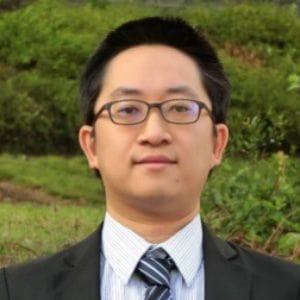
I am a postdoctoral fellow at the University of North Carolina at Chapel Hill, where I investigate Staphylococcus aureus survival during antibiotic treatment within host cells, a key niche for antibiotic-tolerant bacteria. I earned my Ph.D. in Molecular Genetics and Microbiology from Duke University, where I studied stress responses and drug target identification in malaria parasites. At UNC, I developed a high-throughput screening platform to identify compounds that resuscitate and sensitize intracellular S. aureus to antibiotic killing and discovered a host-directed antibiotic adjuvant that enhances antibiotic efficacy across diverse bacterial pathogens.
Renuka Ramanathan
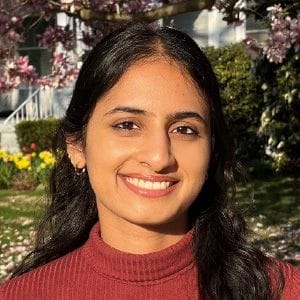
I am a fifth-year graduate student at Yale University in the Department of Molecular, Cellular, and Developmental Biology. My research centers on redox regulation of host cell signaling by the gastric cancer-causing pathogen Helicobacter pylori. Using chemical proteomics, polysome profiling, translation assays, and xenograft tumor models, I aim to understand how oxidative modifications on host proteins influence cellular pathways. I am broadly interested in how host–pathogen interactions impact host physiology and shape the host response to infection.
Deepti Sharan
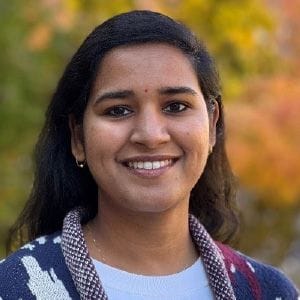
I am a Microbiologist, currently a postdoctoral DFI fellow at the University of Chicago and my research combines microbial physiology, chemical biology, and omics technologies. I investigate how microbes adapt to environmental stressors and influence host health. I studied phenotypic heterogeneity and antibiotic resistance in Mycobacteria during my Ph.D. and later worked on nanomaterial-induced resistance in bacteria, exploring how environmental exposures shape microbial adaptation. I believe that infectious diseases are not just battles between hosts and pathogens, they are also shaped by microbial communities, environmental stressors, and complex metabolic networks. My long-term goal is to develop predictive, microbiome-based strategies that anticipate microbial adaptation and guide the future of infectious disease research.
Megan Tu

I am a third-year Ph.D. candidate in the Department of Biochemistry and Biomedical Sciences at McMaster University, working under the supervision of Dr. Eric Brown. My research takes a systems approach to investigate the physiological trade-offs associated with antibiotic resistance. By understanding how resistance reshapes bacterial physiology, I aim to uncover novel vulnerabilities that can be exploited to treat resistant pathogens.
Claudia Vilhena
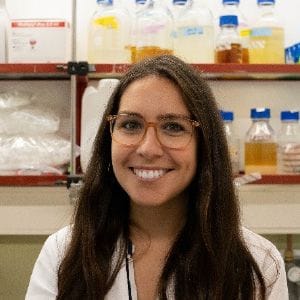
I come from Portugal, where I concluded my masters in Pharmaceutical Science. I fell in love with microbiology which led me to pursue a Ph.D. in Munich, Germany. My work focused on Escherichia coli and signalling transduction mechanisms. My post doc time was at the Leibniz Institute for Infection Biology in Jena where I expanded my interests to include immunology and chemistry. I accessed the role of pneumococcal extracellular vesicles (EVs) on host infection. Currently, I am a junior group leader at the Friedrich-Alexander University in Erlangen. My research focuses on the biogenesis, cellular function and inter-kingdom communication of bacterial EVs.
Phillip Yesley
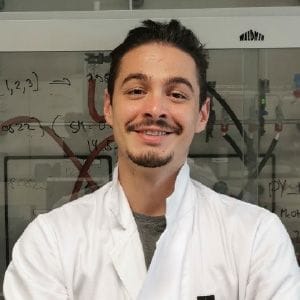
I completed my Master’s in Chemistry at the University of Groningen in 2022 and subsequently joined the Velema lab at Radboud University for my doctorate. Prior to beginning my doctorate, my scant research experience was heavily focused on studying the interactions between small molecules and RNA. I was introduced to this field by Dr. Incarnato in Groningen, where we studied these interactions using next-generation sequencing. Later, I interned at the Disney Lab at the Herbert Wertheim institute (formerly known as Scripps Florida), where I was introduced to RNA-targeted drug discovery. My work at the Velema lab builds on these experiences, by trying to find ways to discover RNA-targeted antibiotics.
Maggie Zheng

I am a researcher in the Department of Chemistry at New York University, where I work in the lab of Dr. Tania Lupoli. My research centers on engineering bacterial nucleotidyltransferases to produce bacterial-specific monosaccharides that play critical roles in host-pathogen interactions. By reconstructing and manipulating enzymes that participate in bacterial specific glycosylation pathways, both in vitro and in vivo, I aim to uncover new molecular targets to disable bacterial pathogenicity. I am particularly interested in applying an interdisciplinary approach, bridging chemistry, biochemistry, and microbiology to investigate host-pathogen interactions at a molecular level. My work has been featured in several leading journals, and I am deeply honored to be a recipient of the Margaret Strauss Fellowship.
